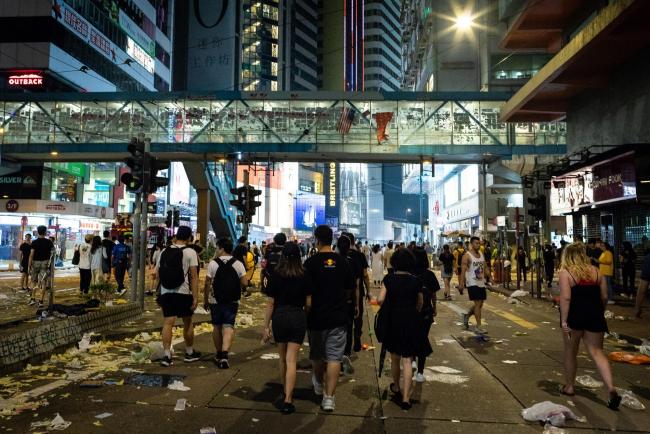(Bloomberg) -- Months of protests in Hong Kong are taking an increasing toll on the city’s economy, with retail sales forecast to decline for a seventh month in August.
The protests and the police response -- both of which are becoming more violent -- have slammed the tourism industry, with visits from mainland China down 42% in August. That collapse has affected shops and the hotel industry, with retail sales forecast to have fallen 14% in August from a year ago and hotel occupancy rates sliding to 66% from 94% in August 2018.
Luxury goods such as jewelry and watches are common purchases by mainland tourists, and the value of those sales slid almost a quarter in July. As the protests drag on and tourists and shoppers stay at home, retailers are having staff take unpaid leave, with some reportedly planning layoffs. Meanwhile, some landlords are slashing rents.
The unrest in Hong Kong is dragging down the luxury industry globally, and brands are re-examining their presence in the city, said analysts.
Bain & Co now sees the global luxury sector growing this year at the low end of the 4% to 6% range, according to analyst Claudia d’Arpizio, while RBC Capital Markets analyst Rogerio Fujimori estimates that most brands will suffer a sales drop in Hong Kong of between 30% and 60% during the third quarter.
The city’s days as a luxury hub are numbered, said Jefferies Ltd. analyst Flavio Cereda, and brands are likely to rethink their presence there. Prada SpA is leading the exodus and plans to close its largest Hong Kong location in Causeway Bay after its lease expires next year.
“Hong Kong is a disaster, like for everybody” said Miuccia Prada, the company’s designer and co-CEO, in an interview after a runway show in Paris on Tuesday.
The Italian company is shifting some marketing investments from Hong Kong to mainland China in the hopes of making up some of the lost sales there, said Lorenzo Bertelli, Prada’s son who is the company’s head of digital communication.
The city’s economy likely entered a technical recession in the third quarter, Financial Secretary Paul Chan said in September. Chan said earlier this week that the government would introduce more stimulus if needed, in addition to higher spending on relief measures. Hong Kong’s government will release the August retail data later on Wednesday.
Cosmetics retailer Sa Sa International Holdings Ltd. said August sales fell 28% from the same period last year and that turnover for the five months ending Aug. 31 will fall about 15% to HK$3 billion ($383 million) compared with a year earlier.
Some smaller store owners have closed down. In Hong Kong’s usually bustling Causeway Bay shopping district, one in 10 stores now stand empty, according to data from real estate agency Midland IC&I Ltd.
Rents in some areas are dropping. Prada SpA’s landlord on Russell Street in Causeway Bay is offering to slash rent by 44%.
It’s not only tourists who are cutting back. In July, shopping at supermarkets was the only major sub-index in the Hong Kong data that didn’t show a decline, meaning consumers spent less on fuel, clothing and shoes and durable goods, in addition to luxury items.
(Updates to add analysts’ comments from fifth paragraph)
